I was unloading, as I sometimes do, about the hard stuff in my life, grief and a general dismay at the state of the world, with my friend Brian Walsh. His campus ministry faith community and the writings that come out of it (Wine Before Breakfast and Remixing the Empire) have a keen sensibility about the brokenness of this world and often hold a posture of lament in solidarity with those who suffer. I don’t know anybody who has taken Walter Brueggemann’s The Prophetic Imagination and its call to weep subversive tears so seriously. This comes through in Brian’s co-authored books such as Truth Is Stranger Than It Used to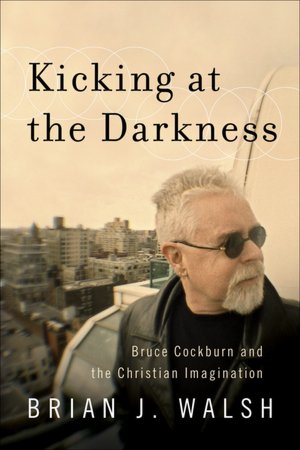 Be and Beyond Homelessness and clearly in his wonderful study of the Canadian poet/rock star Bruce Cockburn, Kicking at the Darkness: Bruce Cockburn and the Christian Imagination. In that book, Walsh shows us some harsh material that Cockburn sings about. But he reminds us that Cockburn sings that “Joy Will Find a Way.” We can believe the singer because he understands the hard stuff “out on the rim of the broken wheel.”
Be and Beyond Homelessness and clearly in his wonderful study of the Canadian poet/rock star Bruce Cockburn, Kicking at the Darkness: Bruce Cockburn and the Christian Imagination. In that book, Walsh shows us some harsh material that Cockburn sings about. But he reminds us that Cockburn sings that “Joy Will Find a Way.” We can believe the singer because he understands the hard stuff “out on the rim of the broken wheel.”
Anyway, Brian replied to me citing a song I love, from one of Cockburn’s fellow musicians and producers, Colin Linden, who sings that it is a “sad, sad, sad, beautiful world.”
“Three sads and one beautiful,” Brian wrote.
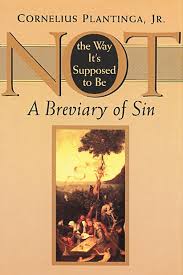
Yep, for most of us, this is so, or nearly so.
When I was first becoming a Presbyterian, and learning about Calvinism and amazing grace, many in my circles talked about our sinfulness (rightly so; without an awareness of our great need, what good is the gospel of Christ?) But even then, I protested: in a sinful world, people are not just sinners, they are, inevitably, sinned against. As Cornelius Plantinga puts it, in the best book on this topic of sin, we have “vandalized shalom” and things are Not The Way It’s Supposed to Be. In a good world now frayed, we are wrong, rebels, but we are wronged, too. We hurt (and I mean that in both meanings.) So, yes, our doctrine of sin leads us to give an account of the various ways things are haywire. Sometimes pain and sorrow is of our own doing, sometimes it is just because of the way of the world. Who knows why there are tsunamis and terrorists and cancers and car-wrecks? Why do we shed tears at this, but maybe not at that? I tend not to think about it much, really, but carry the weight of it with me always. Don’t you?
I can hardly wait — speaking of such things — to tell you that my dear friend Steve Garber has a new book coming in the winter; I will surely tell you more sometime in the New Year. In some ways it is a sequel to Fabric of Faithfulness, and, among other things, it asks a question something like this: “Can we really know the world, and still love it?” That is, knowing the sad, sad, sad world, can we still say (as Colin Linden sings) that it is beautiful? Can we take up vocations with Christ-like care, knowing what we know, carrying what we carry? I don’t recall that Steve cites him, but in his own words and way, he invites us to live into the vocation to which Henri Nouwen calls us, to be “wounded healers.” To care deeply over the long haul of our lives we must learn to love what God loves, even as God does, especially as we come to know more and more that the world is terribly broken.
It’s a sad, sad, sad, beautiful world. And joy will find a way.
So, here are five brand new books that take up this matter, each in their own genre and style.
Each really deserves its own lengthy review, but I will be brief. Buy these books and share them. We have them at 20% off the listed prices, to make it more affordable for you. You will not regret having these. If you don’t need them now, you will soon enough.
W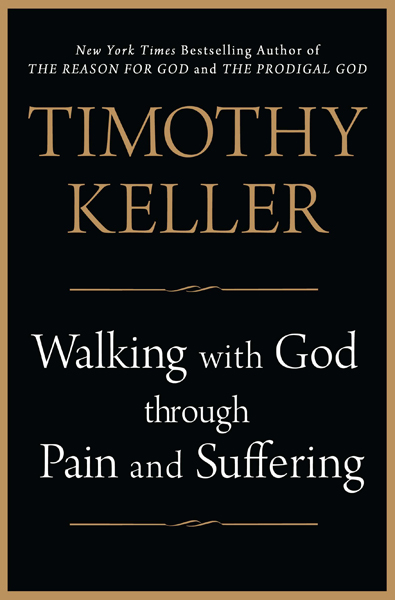 alking with God Through Pain and Suffering
alking with God Through Pain and Suffering Timothy Keller (Dutton) $26.95 This is a truly amazing book, perhaps one of the very best of its kind. Not unlike, say, Philip Yancey or Gerald Sittser, Keller draws on wide sources, but is rooted in robust, theologically conservative, evangelical ground. I assume you know that he is a widely respected, urban and urbane Reformed church planter, now head of staff of a large network of sophisticated parishes in New York City, and is renowned for his thoughtful books and clear, meaty teaching. (
The New York Times suggested that he was this generation’s C. S. Lewis, who, by the way, wrote widely on “the problem of pain” and his own observations of grief.) I wasn’t sure this would necessarily make the book fresh and really useful — some books in this field are theologically sound but rather dry, abstract, even, and I feared this could be the case — might it be too academic and bloodless, proper but without passion? Once I started the book I was immediately drawn in and any concerns I had were put to rest.
I am happy to report that Keller the apologist and Keller the Bible scholar and Keller the pastor are all here. In fact, the book is nicely sequential, starting with several more abstract and “big picture” chapters responding to what he calls, from Ernest Becker, “the rumble of panic” called “Understanding the Furnace” (in which he explores the cultures of suffering, the challenges suffering presents to the religious and the secular worldview, and other of the deeper matters surrounding the problem of evil.) The book then moves into its center piece, a unit called “Facing the Furnace” (which offers mostly conventional, but very profound Biblical and theological guidance for understanding suffering.) This insightful portion is then followed up by a third very pastoral section called “Walking with God in the Furnace” which shows a variety of responses, several ways of coping, different sorts of spiritualities that can help those in anguish. Rev. Keller suggests that those in seasons of suffering might want to read this section first.
So, Walking with God Through Pain and Suffering is a amazingly thoughtful, very good book; it is sharp, orthodox, caring, offering a nice balance of lucid apologetics and crisp argument and tender Biblical insight alongside real-life stories that are both powerful and persuasive. I didn’t know of the personal suffering born by the Keller family, by the way, and knowing this from a few passing portions reminds me that this book emerges from his own walk with God through his own fiery furnaces, making it a very good addition to the library in this field, and a must-read for any Keller fans. I will be revisiting this often, I am sure.
U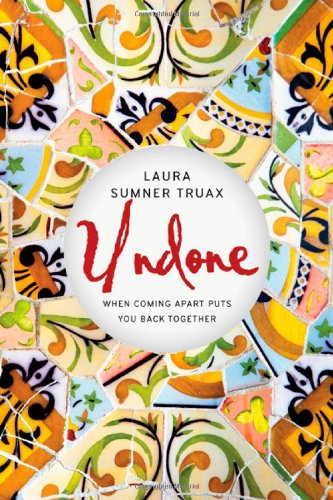 ndone: When Coming Apart Puts You Back Together
ndone: When Coming Apart Puts You Back Together Laura Sumner Truax (IVP/Cresendo) $15.00 When my friend who is an editor at IVP tells me a book is really good, I know it will be so, and this book, not surprisingly, was fantastic. Well written, passionate, raw, at times funny, and a
truly great read, Undone is for anyone who feels like they’ve blown it, gone through hard times (especially if those detours were of their own making) and who may really need an invitation to own up to their own failings. Ms Truax was the perfect Christian young woman, or at least gave the appearance of being so, and we learn much, eventually, about her pretending and her shallowness of faith and piety. The book begins, though, in a riveting way, telling of the harsh day that her divorce was finalized. She knew the failure of the religiously-laden marriage was much her fault, and she knew she had to admit she was falling apart. Wow, have you been there? If not, you know those who have been? This horrible sense of falling part is not to be glamorized, and she does not write about it in that way. Still, she calls this first chapter “my best worst day of my life.”
Can hitting rock bottom be freeing somehow — not in a cheap and sentimental way, but in a profound and authentic manner that really does allow one to grapple with the realities of one’s own messy life? What do we do when life starts to fall apart, when one is coming undone? And should one even encourage such a journey, towards admitting to ones own failures? This narrative is bristling, full of life and energy and sadness and sin, and it is hopeful beyond imagining. Kudos to the author for her vulnerability, exposing her story. (Do you recall the memoir I raved about this summer called Sober Mercies by Heather Kopp, about a respectable Christian author who was an alcoholic? That book was more straight memoir, while this includes more Christian teaching and explication of how this all helps us in our discipleship and faithfulness; reading about the shame of being Undone reminded me of that brave book.)
Although they at first felt a bit like a digression, I realized that Laura Sumner Truaz’s many Bible ruminations were actually quite central to her story, that seeing the great sins and failings and weirdnesses of many Bible characters, can be freeing and redemptive. She has a great knack for weaving in and out of Bible stories, relating them to our own sorry lives, and taking great courage from it all. It is, as I’ve said, a great, helpful book — for the hurting, or, perhaps more, for those of us who want to create fellowships that are congenial to the broken and hurting. There are many books out now about being “authentic” but this one, well, it feels authentic. As one urban minister writes, “I have marked up this book from start to finish with highlights and exclamation marks. Truaz courageously sheds her mask and invites us to do the same.”
If you, or anyone you know, have given up on faith (or even given up on church) because of the false piety or the failings of the so-called formulas for success, this story of a failed leader, now a pastor of the urban LaSalle Street Church in Chicago, a faith community known for its care for the confused and hurting, then this book is for you. She knows, as they say, what it’s like when life hits the fan. Her community relishes the frightening, liberating move of shedding our pretenses, of owning who we really are, wounds and foibles, hurts and sins, and all. Undone: When Coming Apart Puts You Back Together tells her story, and theirs, and I think you will love it. Kudos to IVP for offering this kind of honest, helpful story.
T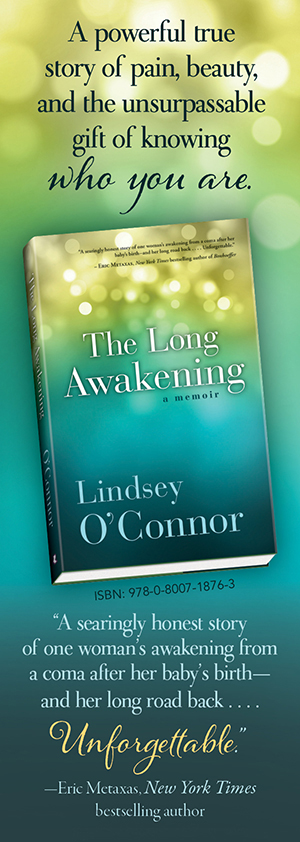 he Long Awakening: A Memoir
he Long Awakening: A Memoir Lindsey O’Connor (Revell) $17.99 You know how we love memoir. When a story is very well told, if it is even slightly moral, we are grateful — a good lesson disguised in a literate telling and powerful narration of a life — a beautiful and artful example of how one makes meaning of one’s own days, is a gift indeed. And this book is, indeed, a great gift. As a memoir, it isn’t directly about the question of theodicy, nor does it directly offer advise about how to cope with life’s hardships. It is profound and moving, though, and I wanted to share it in this list, now.
The story is complicated, but can be summarized simply: Lindsey O’Connor had unexpected complications during the birth of her fifth child, and ended up in a coma for nearly two months. The book begins strikingly with her opening her eyes — she was hooked up to tubes and could hardly move, and could not speak — trying to recall what was going on. She had no idea as she gazed into the face of her husband. Her family is valiant in keeping watch (even as they care for a new baby) and as the story unfolds, we learn of the many subsequent surgeries, further health complications, repeated hospitalizations she went through. What obstacles this family endured, what fears and hardships! There are many useful books about those who have health complications, but this is extraordinary (both because of the unusual nature of the story, and the well crafted telling.) The Long Awakening is beautifully, creatively, written, and O’Connor’s tale is stunningly complex, as she narrates her own inner consciousness (or lack of it, as the case may be) and tells — based on notes and interviews she pieced together later — the experiences of the family and friends that journeyed with her in her ailments. Listen to what esteemed writer Patricia Raybon (I hope you know her wonderful book My First White Friend) says of it: “Brilliant and renewing. A spectacular work of reflection, remembering, reconciling, and recovering. Memoir writing at its finest.”
This is an intimate story, lyrical, honest, scary at times. There is illness, danger, medicine, science, doubt, faith, friendship, anguish and hope… a glimpse into the hard lives some endure, and the brave and good way they emerge towards wholeness.
I know this isn’t helpful, really, to say, but I must put it in writing, for the record: I was blown away by the incredibly beautiful epilogue, the few final pages that are themselves, nearly worth the price of the book. What excellent writing by such a good, good writer, who gently frames her own struggles by other, equally moving stories. As John Biewen (of the Center for Documentary Studies at Duke University) writes,
The Long Awakening “glimmers with a keen understanding of what matters.” Yes!
T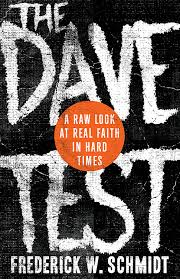 he Dave Test: A Raw Look at Real Life in Hard Times
he Dave Test: A Raw Look at Real Life in Hard Times
Frederick W. Schmidt (Abingdon) $16.99 What is the Dave Test? Dave
was the brother of esteemed Episcopalian writer (he holds the Rueben Job
Chair of Spiritual Formation at Garrett-Evangelical Theological
Seminary) who, as he was dying of cancer, asked searingly honest
questions of his famous brother. As it says on the back cover: “Life is raw.
So is the language of this book.” Yes, when life is tattered at its
edges and you are faced with seemingly impossible decisions, the Dave
Test allows you to become the best, most honest self for you, your
friends, and your family. Instead of resorting to stain-glassed language
or offering false hope, do yourself a favor and pick up this book – and
take the Dave Test.
Mike Stavlund (whose breathtaking book, A Force of Will, about the loss of his young daughter which I mentioned when it first came out) writes,
We’ve
all been both victims and perpetrators of it — the hurtful bit of
spiritual sunshine that is foisted upon a suffering soul. In The Dave Test,
Fred Schmidt shows us a better way to be: honest, empathetic,
vulnerable, earnest, earthy, substantial, and refreshingly uncertain. It
is a beautiful vision for a helpful life.
When
everything falls apart for those we love, what do we say? What do we
do? Well, before you do anything dumb, see if it passes the 10 questions
of “The Dave Test.”
Walter Brueggemann, who wrote the forward, says,
I
read this book with great attentiveness because it rings true. More
than than, I read it with great attentiveness because I also have a
brother, Ed. Ed lives with kidney failure, and his doctors have given
him a limited time for his life. Ed, moreover, is, like Dave, no
bull-shitter. He can spot a phony a mile away. He is rooted in faith,
but he is totally impatient with phonies. For me every reference to Dave
sounded like Ed and I can see myself in Fred’s place. But then, every
reader who pays attention will make something of a like identity as
stand-in for Fred with some Dave who is at risk.
He continues,
This book will be cherished. Because all of us, like Fred and Dave, face loss. We are never ready, I imagine…
Fred
and Dave are characters you will want to know (unless you are in denial
or unable to face such raw realism and nuanced faith.) Schmidt says at
the end, “I am utterly dependent upon the One who loves us both and am
grateful in ways that escape expression. But, oh, how I miss him.”
P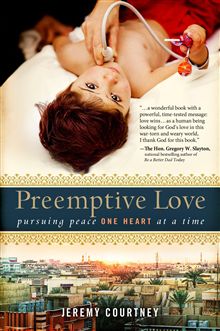 reemptive Love: Pursuing Peace One Heart at a Time
reemptive Love: Pursuing Peace One Heart at a Time Jeremy Courtney (Howard) $24.00
One cannot write as I am trying to do in this column, listing a few new books that are about suffering and hardship and the problem of evil in the world, without naming the sorrows brought about by poverty, injustice, and war. There are many, many (thanks be to God) good books that tell of the good work some are doing to alleviate the misery of the human race. Evangelical Christians, especially, these days, have taken up the calling of being agents of change in the broken world, and publishers who have not previously released books about social justice and cultural renewal are now doing so, often with great effect. I have written before how there is a new renaissance among younger evangelicals, and their stories are being told by many good publishers willing to risk controversy to share this good Kingdom news.
Jeremy Courtney is just such a young follower of Jesus and his faith motivated him and his wife (and two children) several years ago to move to Iraq, working at first with a relief and development agency there. They lived without much electrical power in their home, they had marriage hardships, their work was fulfilling but difficult and frustrating. And, then, in an encounter which truly changed the course of their lives, Jeremy met a man who tenaciously asked him to help find a doctor for his young nephew’s heart problems.
This encounter did indeed change Courtney — moving him (eventually) to learn to trust,
to “love first and ask questions later.” He eventually developed a philosophy of countering the injustices of the world which he has come to call “preemptive love” and the emergence of this profound missional vision is part of the story of this book. The
Preemptive Love Coalition is also the name of the organization he eventually co-founded, a ministry that — yes, you guessed it — helps heal the hurt hearts of Iraqi children.
You see, the wars there (starting at least with the genocidal gassing of Kurdish villages by Saddam Hussein and certainly including the enhanced radiation weapons US forces used in wars there) have caused parts of that region to become one of the most toxic places on Earth. Did you know that there is an epidemic of heart disease among Iraqi children? And, you will not be surprised to know, they have no trained heart surgeons or places to do sophisticated heart surgery on children in the whole country. For any number of reasons, the regimes there have not funded the medical infrastructure (and there was the devastating sanctions of previous decades) so there has been a brain-drain, as well — there just are not doctors or hospitals or researchers capable to do the sorts of life-saving heart work so very badly needed. The rate of congenital heart problems in Iraq is soaring and the Preemptive Love Coalition is working to end the backlog of kids waiting for surgery.
Courtney recounts taking by commercial airline sheaves of paperwork to nearby Jordon in a paper chase that was destined to save lives — but only a few lives. Which precious child’s heart could be repaired? Only a few fortunate ones where chosen while hundreds if not thousands who had need were sent home. Village doctors would (with uncanny gifts and knowledge) put their heads on the chests of the little ones, listening carefully for the holes in their hearts. More advanced medical care just didn’t exist.
Preemptive Love is a heckuva book — thrilling, exciting, exasperating, tragic, comic, honest. I could write for pages about the episodes, from the first meeting with the tenacious uncle in the lobby of a Baghdad hotel to the vivid narrative of the horrific poison gas bombing of Halabja on March 16th 1988 to his telling of “The Iranian Bard and His Beautiful Shoes” to the stories of betrayal, hostility among the Turks, and the ongoing brave work bringing health care to families of children in a volatile war zone. And the price it has cost them, emotionally and spiritually, struggles and consequences about which they hint. This really is an amazing story, and an amazing book.
There are fine and inspiring books of people who cope with hardships by trying to rise above it all. There are fine and inspiring books that pull at our heart strings as they tell of serving the poor, stories of mission and ministry. They sometimes feel like an info-mercial, and they are good for just such purposes.
Mr. Courtney’s book, though, is in a different league, I think, as it covers mission and history,
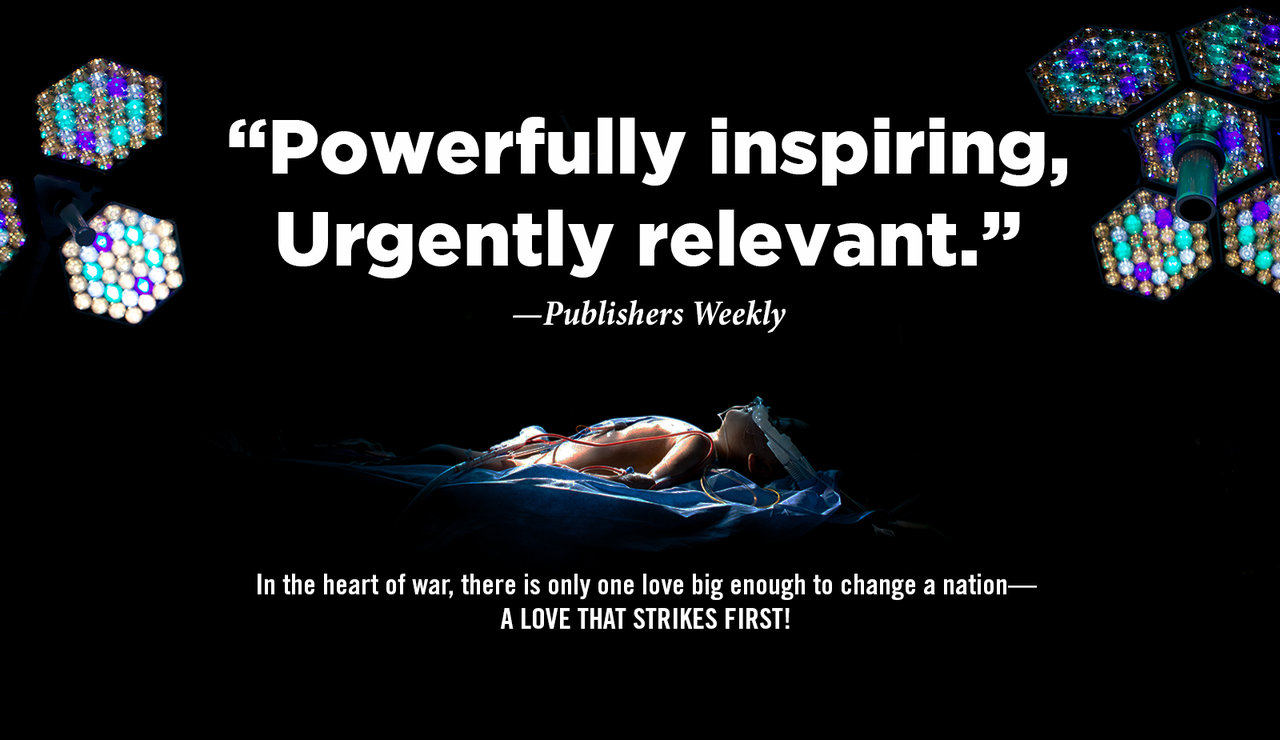
personal memoir and adventure, political insight and a broader vision of the common good than do some commendable specific mission stories. And the Preemptive Love Coalition has at its core this very, very important truth: that to be God’s agents of reconciliation, we simply must undo some of the wrongs we have caused or have been complicate. We must not only seek to heal the wounded politics of war, we must serve the victims. And even our enemies will be forgiving if we offer to help their dying children. This book is a moving memoir telling of dramatic medical missionary work, but it is more: it offers a rare and profound vision of peacemaking.
Muslim, Christian, Arab, Kurdish, Turkish, Iraqi, Iranian, Western, terrorist, revolutionary, imperialist — the hostilities are thicker than Turkish coffee and yet Jeremy has walked among them all. Offering to heal the broken hearts of those with a history, those with legacies of betrayal and persecution, by literally fixing the holes in the hearts of their children, seems to be a universally effective means of offering what I might call penance. He does not use that word, and perhaps I am over-reaching, but it seems clear to me that if we are to be peacemakers — to be called ‘children of God’ as Jesus Himself promises — we must insert ourselves in incarnational ways among the victims of our “warring madness” as the old hymn puts it. Medical missions offered for sick children is an ideal and fruitful means of grace. As he simply writes, “Surgeries speak.” This is more, though, than a feel-good story of helping sick kids. This is a profound example of new strategies for the doing God’s reconciling work among the nations.
The writing is simple and story-driven. It is not highbrow literature or allusive memoir. We learn frankly about the ups and downs of a young man from Texas starting an internationally renowned Middle Eastern ministry. We watch him navigate intense matters (of immense cultural, linguistic, religious, and diplomatic complexity) often, it seems, by the seat of his pants. The story is powerful and surprising and the book is remarkably good. One U.S. Senator, himself Jewish, writes that this is “a beautiful and inspiring book about the power of love in a time of war and the capacity of personal interactions to break through, build trust, and save lives.”
Listen to Shane Claiborne (who spent some time in Iraq himself, you will recall) wh
o writes:
Jeremy Courtney is doing some of the most redemptive work on the planet, providing lifesaving surgeries for Iraqi children. From TED talks, to mega-churches, to Congress to the UN, Jeremy’s message that “violence unmakes the world, and love remakes it” has been transforming hearts and minds. Now that message is in your hands. Share it with the world.
BookNotes
SPECIALDISCOUNTANY ITEM MENTIONED
20% off
order heretakes you to the secure Hearts & Minds order form pagejust tell us what you want
inquire here
if you have questions or need more information
just ask us what you want to know
Hearts & Minds 234 East Main Street Dallastown, PA 17313 717-246-3333
read@heartsandmindsbooks.com
 Be and Beyond Homelessness and clearly in his wonderful study of the Canadian poet/rock star Bruce Cockburn, Kicking at the Darkness: Bruce Cockburn and the Christian Imagination. In that book, Walsh shows us some harsh material that Cockburn sings about. But he reminds us that Cockburn sings that “Joy Will Find a Way.” We can believe the singer because he understands the hard stuff “out on the rim of the broken wheel.”
Be and Beyond Homelessness and clearly in his wonderful study of the Canadian poet/rock star Bruce Cockburn, Kicking at the Darkness: Bruce Cockburn and the Christian Imagination. In that book, Walsh shows us some harsh material that Cockburn sings about. But he reminds us that Cockburn sings that “Joy Will Find a Way.” We can believe the singer because he understands the hard stuff “out on the rim of the broken wheel.”
 alking with God Through Pain and Suffering Timothy Keller (Dutton) $26.95 This is a truly amazing book, perhaps one of the very best of its kind. Not unlike, say, Philip Yancey or Gerald Sittser, Keller draws on wide sources, but is rooted in robust, theologically conservative, evangelical ground. I assume you know that he is a widely respected, urban and urbane Reformed church planter, now head of staff of a large network of sophisticated parishes in New York City, and is renowned for his thoughtful books and clear, meaty teaching. (The New York Times suggested that he was this generation’s C. S. Lewis, who, by the way, wrote widely on “the problem of pain” and his own observations of grief.) I wasn’t sure this would necessarily make the book fresh and really useful — some books in this field are theologically sound but rather dry, abstract, even, and I feared this could be the case — might it be too academic and bloodless, proper but without passion? Once I started the book I was immediately drawn in and any concerns I had were put to rest.
alking with God Through Pain and Suffering Timothy Keller (Dutton) $26.95 This is a truly amazing book, perhaps one of the very best of its kind. Not unlike, say, Philip Yancey or Gerald Sittser, Keller draws on wide sources, but is rooted in robust, theologically conservative, evangelical ground. I assume you know that he is a widely respected, urban and urbane Reformed church planter, now head of staff of a large network of sophisticated parishes in New York City, and is renowned for his thoughtful books and clear, meaty teaching. (The New York Times suggested that he was this generation’s C. S. Lewis, who, by the way, wrote widely on “the problem of pain” and his own observations of grief.) I wasn’t sure this would necessarily make the book fresh and really useful — some books in this field are theologically sound but rather dry, abstract, even, and I feared this could be the case — might it be too academic and bloodless, proper but without passion? Once I started the book I was immediately drawn in and any concerns I had were put to rest.  ndone: When Coming Apart Puts You Back Together Laura Sumner Truax (IVP/Cresendo) $15.00 When my friend who is an editor at IVP tells me a book is really good, I know it will be so, and this book, not surprisingly, was fantastic. Well written, passionate, raw, at times funny, and a
ndone: When Coming Apart Puts You Back Together Laura Sumner Truax (IVP/Cresendo) $15.00 When my friend who is an editor at IVP tells me a book is really good, I know it will be so, and this book, not surprisingly, was fantastic. Well written, passionate, raw, at times funny, and a he Long Awakening: A Memoir Lindsey O’Connor (Revell) $17.99 You know how we love memoir. When a story is very well told, if it is even slightly moral, we are grateful — a good lesson disguised in a literate telling and powerful narration of a life — a beautiful and artful example of how one makes meaning of one’s own days, is a gift indeed. And this book is, indeed, a great gift. As a memoir, it isn’t directly about the question of theodicy, nor does it directly offer advise about how to cope with life’s hardships. It is profound and moving, though, and I wanted to share it in this list, now.
he Long Awakening: A Memoir Lindsey O’Connor (Revell) $17.99 You know how we love memoir. When a story is very well told, if it is even slightly moral, we are grateful — a good lesson disguised in a literate telling and powerful narration of a life — a beautiful and artful example of how one makes meaning of one’s own days, is a gift indeed. And this book is, indeed, a great gift. As a memoir, it isn’t directly about the question of theodicy, nor does it directly offer advise about how to cope with life’s hardships. It is profound and moving, though, and I wanted to share it in this list, now. he Dave Test: A Raw Look at Real Life in Hard Times
he Dave Test: A Raw Look at Real Life in Hard Times reemptive Love: Pursuing Peace One Heart at a Time Jeremy Courtney (Howard) $24.00
reemptive Love: Pursuing Peace One Heart at a Time Jeremy Courtney (Howard) $24.00 personal memoir and adventure, political insight and a broader vision of the common good than do some commendable specific mission stories. And the Preemptive Love Coalition has at its core this very, very important truth: that to be God’s agents of reconciliation, we simply must undo some of the wrongs we have caused or have been complicate. We must not only seek to heal the wounded politics of war, we must serve the victims. And even our enemies will be forgiving if we offer to help their dying children. This book is a moving memoir telling of dramatic medical missionary work, but it is more: it offers a rare and profound vision of peacemaking.
personal memoir and adventure, political insight and a broader vision of the common good than do some commendable specific mission stories. And the Preemptive Love Coalition has at its core this very, very important truth: that to be God’s agents of reconciliation, we simply must undo some of the wrongs we have caused or have been complicate. We must not only seek to heal the wounded politics of war, we must serve the victims. And even our enemies will be forgiving if we offer to help their dying children. This book is a moving memoir telling of dramatic medical missionary work, but it is more: it offers a rare and profound vision of peacemaking.